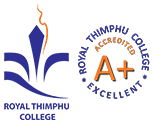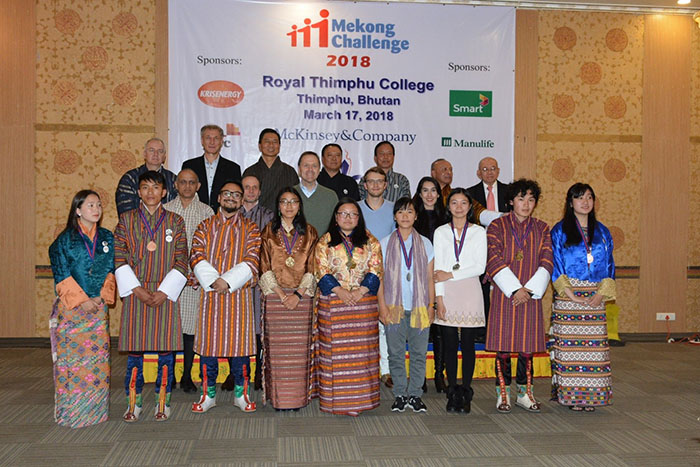
On March 17, 2018, history was made. On this day in spring, three teams of students from Royal Thimphu College, representing Bhutan, competed against eight other teams from Vietnam, Myanmar, Cambodia and Laos in the Mekong Business Challenge.
The Mekong Business Challenge is the elite business competition of Southeast Asia. The rules are simple. In one year, teams are told to:
- come up with the best new business idea they can imagine (a “value proposition”),
- figure out who their ideal customers are (the “customer segment”),
- identify their business needs and how they will meet them (the “partnerships”),
- calculate what running the business will cost (the “cost structure”) and where the money will come from (“revenue”), and then….
- see if the ideal model works in practice (it never does exactly), and when it doesn’t,
- change the business model (a “pivot”) - and keep changing it - until it does work!
Royal Thimphu College is the only A+ accredited higher education institution in Bhutan. The College had entered student teams in the Mekong Business Challenge in previous years as well. In Phnom Penh, Cambodia in 2016, a RTC team with a business model of interlocking bricks placed 2nd. Two places behind it 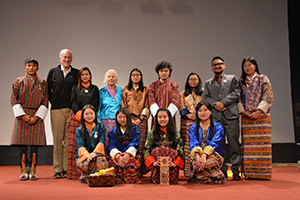 was another RTC team that proposed making pasta from wild yam. In 2017, RTC students again came in 2nd in the competition held in Yangon, Myanmar. Their business idea was “Gladden Guli,” a venture that would make avocado tea and avocado food powder. With two silver medals in two years, the stage was set for RTC students to participate in the 2018 Mekong Business Challenge - to be held in Bhutan, and at Royal Thimphu College.
was another RTC team that proposed making pasta from wild yam. In 2017, RTC students again came in 2nd in the competition held in Yangon, Myanmar. Their business idea was “Gladden Guli,” a venture that would make avocado tea and avocado food powder. With two silver medals in two years, the stage was set for RTC students to participate in the 2018 Mekong Business Challenge - to be held in Bhutan, and at Royal Thimphu College.
In a field of 11 teams from countries whose population is 10 to 100 times the population of Bhutan, against some contestants who were up to twice their age, Royal Thimphu College students took 1st, 3rd, and 5th place. Three out of the five top spots! How did this happen?
To begin, each of the RTC teams had a good idea.
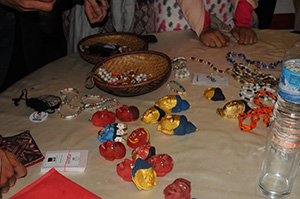 Team SHOGJUR (Sherab Choden Dorji, Nima Kandu and Chimi Lhamo) had the idea of turning waste paper into commercially valuable paper jewelry, ornaments and souvenirs. Their project addresses four national problems of Bhutan simultaneously: waste management, cultural preservation, unemployment and balance of payments. Their project will empower rural women to create livelihood opportunities and independence.
Team SHOGJUR (Sherab Choden Dorji, Nima Kandu and Chimi Lhamo) had the idea of turning waste paper into commercially valuable paper jewelry, ornaments and souvenirs. Their project addresses four national problems of Bhutan simultaneously: waste management, cultural preservation, unemployment and balance of payments. Their project will empower rural women to create livelihood opportunities and independence.
Team GURAM (Phuntshok Dechen Yangchen, Deepsika Chhetri and Tashi Darjay) realized that no one in Bhutan produces a Bhutanese candy. They developed a candy made of local ingredients and herbs that have medicinal benefits as well as 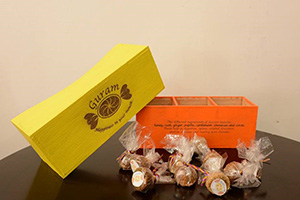 wonderful taste. Travel agencies want the candy for their customers, packaged in the cheery colors of Bhutan. The project will benefit farmers who cultivate herbs, create jobs, and result in import substitution.
wonderful taste. Travel agencies want the candy for their customers, packaged in the cheery colors of Bhutan. The project will benefit farmers who cultivate herbs, create jobs, and result in import substitution.
Team YUKYIM (Choni Selden, Neema Tamang and Sonam Tshokey) looked at the social problem of alcoholism and matched it with the age old tradition of fruit wine. Using recipes passed down for generations in the beautiful valley of Bumthang, they developed a line of low alcohol wines from locally grown fruits such as plums, pears and pineapples. Their wines can be served at private functions as well as government events, which call for the use of local beverages when alcohol is served.
Good ideas are no good at all without good work! Each of RTC’s teams spent hundreds of hours market testing their products, talking with potential suppliers, conducting customer surveys, developing a logo and brand identity, understanding their competition, and, with a sharp pencil, figuring out whether they could actually make a profit. In every case, there were necessary pivots as the students came to realize what would work and what would not. Team SHOGJUR, for example, began with a simple idea: buy new paper, make paper necklaces and sell them to retailers. SHOGJUR now has a very different model: retrieve waste paper from shops and schools, offer a line of products that can be certified as authentically Bhutanese, use rural women to make the jewelry and painting students to decorate them, and sell them to tourists at higher prices at stores with incentives that allow SHOGJUR to control the sales price.
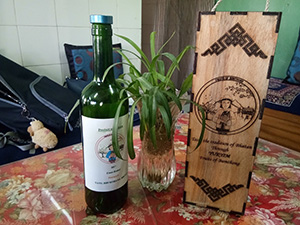 In developing their business model, each team experienced highs and lows. According to YUKYIM’s Sonam Tshokey, “the worst part was when [one adult] promised to do something for us, and we never heard from him.” For Chimi Lhamo of Team SHOGJUR, on the other hand, “I couldn’t believe [a famous person in Bhutan] would actually care about our project and help us find the suppliers we need.” Tashi Darjay, of Team GURAM, realized his project was not just make-believe when three businesses offered to give the team a substantial amount of money to start their candy business. There were many times when all three teams were tired, however, they always kept going.
In developing their business model, each team experienced highs and lows. According to YUKYIM’s Sonam Tshokey, “the worst part was when [one adult] promised to do something for us, and we never heard from him.” For Chimi Lhamo of Team SHOGJUR, on the other hand, “I couldn’t believe [a famous person in Bhutan] would actually care about our project and help us find the suppliers we need.” Tashi Darjay, of Team GURAM, realized his project was not just make-believe when three businesses offered to give the team a substantial amount of money to start their candy business. There were many times when all three teams were tired, however, they always kept going.
On the eve of the competition, everyone was nervous. Deepsika Chhetri of Team GURAM went over the things she would say and the questions she might need to answer. On Team SHOGJUR, Nima Khandu rehearsed what he would say in front of a mirror. Neema Tamang of Team YUKYIM, who was scheduled to present in the afternoon, was so nervous she chose to meditate instead of having lunch.
Then it was time to present. SHOGJUR went first. The judges loved their jewelry. There was chemistry and laughter as Nima Khandu answered one question fully, then asked the judge if he had fully answered the question. YUKYIM was next. They talked about their home valley. They talked about their grandmother’s recipe and told the judges, to great applause, that their wine had no expiry date. Team GURAM came last. They had arranged with the hotel where the judges were staying to have their candy placed on the pillow of every judge. The judges loved their creative marketing in real time. They applauded the boldness of their pricing decisions.
The results of the competition were announced at the final dinner that night. All three teams - SHOGJUR, GURAM and YUKYIM – agreed later there had been days in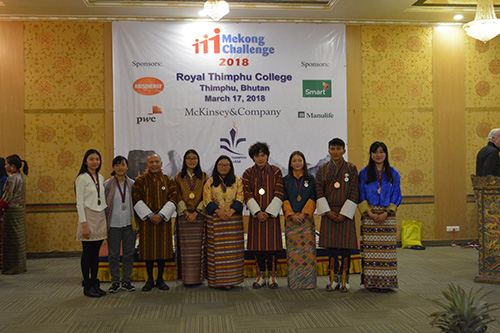 practice when each one of them had been the best, and any of them could have finished first. On March 17, 2018, however, the order in the judges’ opinion was SHOGJUR in first place and GURAM in third. One judge sent a message to YUKYIM later that the competition for third place was “very close.” Close enough, in the minds of their supporters, that Team YUKYIM earned at least an honorary 5th place.
practice when each one of them had been the best, and any of them could have finished first. On March 17, 2018, however, the order in the judges’ opinion was SHOGJUR in first place and GURAM in third. One judge sent a message to YUKYIM later that the competition for third place was “very close.” Close enough, in the minds of their supporters, that Team YUKYIM earned at least an honorary 5th place.
The celebration was real, and the results were deserved. The judges said that 2018 was the strongest field ever in the Mekong Business Challenge. The teams from the different countries dissolved and reformed as friendship groups, going from table to table, making new acquaintances, sharing email and Facebook addresses, taking selfies, planning things to do together that evening. Bhutanese dancers had entertained teams while dinner was served, but the evening ended with everyone – everyone – joining in a great circle of Bhutanese dancing. It was a celebration both of hard work and of a wise perspective about that hard work.
For the three student teams from RTC, the celebration continues. All three teams will present to an audience of Bhutan’s business leaders and investors sponsored by the Royal Monetary Authority on 17th of May, 2018. Team SHOGJUR goes on to represent Bhutan and Southeast Asia at the International Business Model Competition in the United States, to be held in Provo, Utah on May 10 -11, 2018. There is no reason they cannot win the world competition as well. Phuntshok Dechen Yangchen, from Team GURAM, has been awarded a scholarship to study at Pitzer College in the United States as an exchange student next year. When she returns, Team GURAM will continue its ambition to be the sole provider of candy to tourists who visit Bhutan and the dominant provider of candy to their countrymen. Team YUKYIM was approached during the competition by the coach of one of the Cambodian teams, who offered to help in opening a market for their fruit wines in Cambodia. They are also in touch with an American fruit wine maker to develop their products.
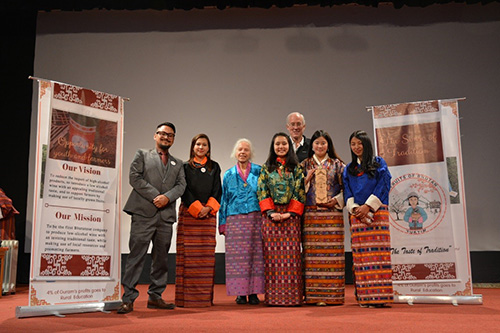 Royal Thimphu College is delighted at the success of its students - especially the faculty members who work each year with the Mekong Business Challenge teams. Madhav Verma, one of the coaches, says “the competition shows what students are capable of when they work hard.” Kabita Chhetri, another coach, observes that “everyone is worried about getting a job after college. Well, these students created their own jobs.” Steve Griffith, third coach, says “I love the moment when students realize their own potential.” Dr. Janet Schofield added, “I can’t wait to see what next year’s teams will do.”
Royal Thimphu College is delighted at the success of its students - especially the faculty members who work each year with the Mekong Business Challenge teams. Madhav Verma, one of the coaches, says “the competition shows what students are capable of when they work hard.” Kabita Chhetri, another coach, observes that “everyone is worried about getting a job after college. Well, these students created their own jobs.” Steve Griffith, third coach, says “I love the moment when students realize their own potential.” Dr. Janet Schofield added, “I can’t wait to see what next year’s teams will do.”
In the words of the President of Royal Thimphu College, the Hon. T. S. Powdyel, “this is what education should be about – expanding the mind, developing values, opening the future. The confidence and self-assurance students have gained here will serve them for the rest of their lives.” The Mekong Business Challenge has indeed helped students to find themselves and realize what they can do. Choni Selden of Team YUKYIM wrote, “We joined just to try our luck, but after joining we realized it wasn’t us who were after luck. It was actually luck that was after us.
